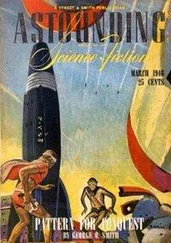“I have,” said Terry dourly. “I told your father so. I was irritated because I couldn’t get any answers to the questions I asked. Now I’ve got some questions your father wants answers to. And I’m going to try to find them out.”
Deirdre sighed, perhaps in relief.
“I put some pictures and a clipping in a book on the cabin table,” she said. “Did you see them?”
He nodded.
“What did you think?”
“That you put them for me to see,” he said.
“It was to make you realize that we can’t answer every question, which you know now.”
“I still think you could answer a few more than you have,” he observed. “But let it go. Is the Barca harbor shallow?”
“Ten, fifteen feet at low tide,” she informed him. “We’re having a sort of dredge made there. Something to go down into the sea, take pictures, get samples of the bottom, and then come up again. There’s an oceanographic ship due in Manila shortly, by the way. It will have a bathyscaphe on board. Maybe that will help find out some answers.” Then she said uncomfortably, “I have a feeling the bathyscape isn’t… safe.”
He glanced up.
“Ellos?” He grinned as she looked sharply at him. Then he said, “This dredge: isn’t it pretty ambitious for a boat this size to try to dredge some thousands of fathoms down?”
“It’s a free dredge,” she said. “It will sink by itself and come up by itself. There’s no cable. What are you doing now?”
He’d put away the submarine microphone he’d just altered and was now taking out the still untested underwater horn.
“I’m going to try to make this directional, too,” he said. “In fact, I’m going to try to make it project sound in a beam shaped like a fan. A hollow cone may come later.”
She was silent. The Esperance sailed on. “Ever talk to the skipper of La Rubia?” he asked presently.
She shook her head.
“You should. He’s a stupendous, self-confident liar,” said Terry. “He lies automatically. Gratuitously. A completely amiable man, but he can’t tell the truth without stopping to think.”
“We found that out,” said Deirdre. “I didn’t. Someone else.”
“Is this another censored subject, or can I ask what happened?”
“I’d better see about lunch,” said Deirdre quickly. She got up and left. Terry shrugged. The day before yesterday, or even yesterday, he’d have been indignant. But then he’d known these people had secrets in which he had no share. Today he was beginning to share those secrets, and he had fabulously nonsensical material on which to work on his own. He had strange ideas about the event of last night. He did not quite believe them, but he thought he had devised some ways to see how much of truth they contained, if any. Deirdre could keep her secrets, so long as he did not have to disclose his own wildly imaginative ideas.
The routine of the yacht went on. It was in a way a very casual routine. Davis gave orders when the need arose, but there was no formal discipline; there was cooperation. Terry heard one of the crew-cuts ask Deirdre a question using her first name. It would have been highly improbable in a paid crew, but it was reasonable enough in a volunteer expedition. He heard Deirdre say, “Why don’t you ask him?”
The crew-cut, Tony, came to the part of the deck where Terry worked.
“We got into an argument,” he said without preface. “We were talking about that… ‘whale’ last night.”
Terry nodded. The use of the term “whale” was a deliberate pretense that the previous night’s events were natural and normal.
“How fast do you think it was traveling when it broached?” asked Tony. “I know a whale can jump clear of the water. I’ve seen it in the movies. But that one jumped awfully high!”
“I hadn’t tried to estimate it,” said Terry.
“You’ve got a tape of the noise,” said Tony. “Could you time the interval between the sound when it left the water, and the splash when it fell back?”
“Mmm. Yes,” said Terry. He looked up. “Of course.”
“It would be interesting to do it,” said Tony, semicasually. Then he added hastily, “I’ve read somewhere that whales have been clocked at pretty high speeds. If we can find out how long its leap lasted, we could know how fast it was going.”
Terry considered for a moment, and then got out the recorder. He played the tape for a moment, and skipped forward to later parts of the record until he came to the place where the unpleasant humming sound was loud, and finally reached the beginning of the rushing noise. That, in turn, had preceded the leap of the object photographed by the gun-cameras.
Terry glanced at his watch when the rushing started. He timed the period of ascent of the noise, while it grew louder and louder and became a booming sound, which was at its loudest the instant before it ceased. At that moment the mysterious object had leaped out of the sea. The splash of its re-entry came long seconds later.
Tony timed the leap. When the splash came he made his calculations absorbedly, while Terry switched off the recorder.
“It would take the same amount of time going up as it does coming down,” said Tony, scribbling numbers. “Since we know how fast things fall, when we know how long they fall we can tell how fast they were traveling when they landed, and therefore when they leaped.”
He multiplied and divided.
“Sixty miles an hour, roughly,” he pronounced. “The whale was going sixty miles an hour straight up when it left the water! What can swim that fast?”
“That’s your question,” said Terry. “Here’s one of mine. We heard it coming for five minutes ten seconds. How deep is the water where we were?”
“About forty-five hundred fathoms.”
“If we assume that it came from the bottom, it must have been traveling at least sixty miles an hour when it broke surface,” said Terry.
“But can a whale swim sixty miles an hour?”
“No,” said Terry.
Tony hesitated, opened his mouth, closed it, and went away.
Terry returned to the changing of the submarine horn. Sound has its own tricks underwater. If you know something about them you can produce some remarkable results. A deliberately made underwater signal can be heard through an unbelievable number of thousands of miles of seawater. But, except through a yet untested fish-driving paddle, Terry had never heard of fish being herded by sound. Still, fish can be stunned or killed by concussions. They have been known to be made unconscious by the noise of a very near submarine bell. It wasn’t unreasonable that a specific loud noise could make a barrier no fish would try to cross. But there were still some parts of last night’s events that did not fit into any rational explanation. Davis came over to Terry.
“I think,’” he said, “that we may have missed a lot of information by not having submarine ears before. There may have been all sorts of noises we could have heard.”
“Possibly,” agreed Terry.
“We’re more or less in the position of savages faced with phenomena they don’t understand,” said Davis vexedly. “The simple problems of savages range from what produces thunder to what makes people die of disease. Savages come up with ideas of gods or devils doing such things for reasons of their own. We can’t accept ideas of that sort, of course!”
“No,” agreed Terry, “we can’t.”
“But what happened last night,” said Davis, “is almost as mysterious to us as thunder to a savage. A savage would blame it on devils or whatnot”
“Or on ellos,” said Terry.
“He’d imagine a personality behind it, yes,” said Davis. “He does things because he wants to, so he thinks all natural phenomena occur because somebody wants them to. He has no idea of natural law, so he tries to imagine what kind of person—what kind of god or devil—does the things he notices. It’s a natural way to think.”
Читать дальше










